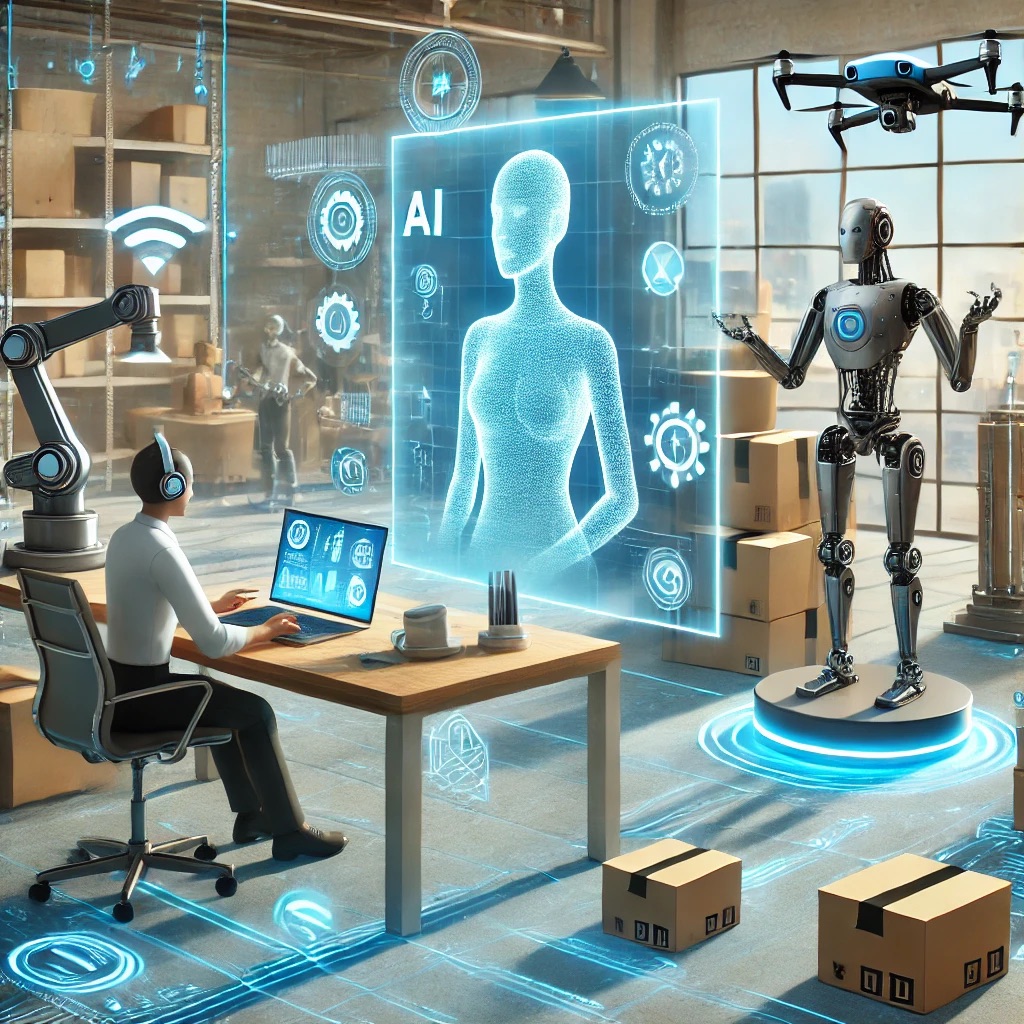Artificial intelligence is no longer a futuristic concept—it’s here, reshaping industries and redefining how we work. From AI-driven automation in manufacturing to machine learning algorithms optimizing business decisions, AI is transforming the workplace faster than most people expected.
But with this transformation comes uncertainty. Will AI take my job? How can workers adapt to AI advancements instead of being replaced by them? Which industries will thrive in an AI-driven economy?
In this post, we’ll explore how AI is changing the workforce, which jobs are at risk, and how both individuals and businesses can future-proof themselves in an AI-powered world.
AI and Automation: The Jobs Most at Risk
AI is particularly effective at automating repetitive, rule-based tasks—which means some jobs will be significantly impacted. According to a 2023 Goldman Sachs report, AI could replace 300 million full-time jobs worldwide.
Industries Facing the Biggest Disruptions
🏭 Manufacturing & Warehousing
- AI-powered robotic arms in factories are already replacing human workers in repetitive assembly-line tasks.
- Amazon’s warehouses deploy AI-driven robots to sort and move products faster and more efficiently than humans.
- Tesla’s automated production lines minimize human intervention in car manufacturing.
Potential job losses: Factory workers, warehouse packers, assembly line staff.
New opportunities: AI maintenance engineers, robotics specialists, logistics coordinators.
🛒 Retail & Customer Service
- AI-powered chatbots (like ChatGPT and Google Bard) are handling millions of customer inquiries, reducing the need for human call center agents.
- Retail stores are experimenting with cashier-less checkout—Amazon Go uses AI-powered sensors to detect purchases and charge customers automatically.
Potential job losses: Cashiers, customer service agents, retail sales associates.
New opportunities: AI chatbot trainers, customer experience analysts, UX designers.
🚛 Transportation & Delivery
- Companies like Waymo (Google’s self-driving car project) and Tesla are advancing autonomous vehicle technology—potentially reducing the need for human drivers.
- Drone deliveries are being tested by Amazon Prime Air to replace human couriers.
Potential job losses: Truck drivers, delivery workers, taxi and ride-share drivers.
New opportunities: AI fleet managers, self-driving car technicians, drone operators.
💰 Finance & Accounting
- AI algorithms can now analyze massive financial datasets, replacing many entry-level accounting and financial analyst jobs.
- Robo-advisors like Betterment and Wealthfront use AI to provide automated financial planning.
Potential job losses: Entry-level accountants, financial analysts, loan officers.
New opportunities: AI ethics auditors, financial data analysts, algorithmic trading specialists.
Jobs That AI Won’t Replace (Anytime Soon)
While AI excels at automating structured, repetitive tasks, it struggles with human creativity, emotional intelligence, and strategic decision-making. Some careers are far more AI-proof than others.
🧠 Jobs Requiring Complex Problem-Solving & Creativity
- AI Engineers & Machine Learning Specialists – AI itself needs developers, researchers, and ethical auditors to ensure it functions responsibly.
- Marketing & Content Creators – AI can assist in writing, but human creativity and storytelling remain crucial for branding and content creation.
- Psychologists & Therapists – AI can simulate conversation, but it lacks true empathy and human understanding.
👥 Jobs Requiring Strong Human Interaction & Social Skills
- Healthcare Workers (Doctors, Nurses, Surgeons) – AI can assist with diagnoses and robotic surgeries, but human judgment is essential.
- Teachers & Educators – AI-powered tutoring tools exist, but human teachers provide mentorship, adaptability, and real-world experience.
- Skilled Trades (Electricians, Plumbers, Mechanics) – While AI-powered robots exist, most home repairs and technical fixes require human adaptability.
How to Future-Proof Your Career in an AI-Driven World
The best way to stay ahead of AI-driven disruption is to develop skills that AI struggles with and adapt to new technologies. Here’s how:
1. Develop AI Skills (Even if You’re Not a Techie)
AI is impacting every industry, not just tech. Having basic AI literacy will help you stay competitive.
🚀 Learn AI basics with free courses and content:
Even if you’re in marketing, finance, or healthcare, understanding AI tools will give you a huge career advantage.
2. Embrace Lifelong Learning
The half-life of skills is shrinking—what you learned five years ago might already be outdated. To stay ahead, commit to continuous learning.
📖 Stay updated with AI news:
- This website! Skytech.io has massive amounts of content on AI and growing every day.
3. Focus on Human-Centric Skills
AI can process data faster than any human, but it can’t replace emotional intelligence, leadership, and creativity.
👥 Skills that AI can’t replicate:
- Critical thinking & problem-solving
- Emotional intelligence & leadership
- Creativity & storytelling
- Ethics & decision-making
4. Learn to Work Alongside AI
Instead of seeing AI as a threat, use it to enhance your work. AI tools like:
- Grammarly (AI-assisted writing)
- Tableau (AI-powered data visualization)
- Jasper AI (AI copywriting assistant)
Can boost productivity—giving you an edge over others who refuse to adapt.
The Future of Work: AI as a Co-Pilot, Not a Replacement
AI won’t take all jobs—but people who use AI will replace those who don’t.
The key to thriving in an AI-driven economy is:
✔️ Learning how AI works (even at a basic level)
✔️ Adapting your skill set to focus on creativity and human-centric roles
✔️ Using AI as a tool rather than ignoring it
The future isn’t about AI vs. humans—it’s about AI and humans working together.
In the final post of this series, we’ll explore AI’s role in the creative industries—can machines be truly artistic? Stay tuned!
